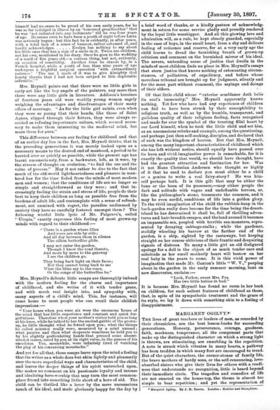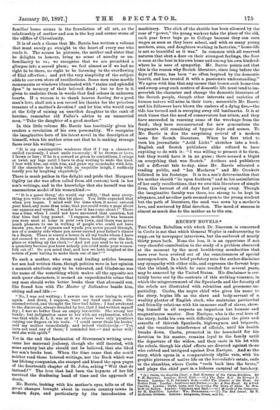MARGARET OGILVY"'
THE lives of great teachers or leaders of men, as recorded by their chroniclers, are the best lesson-books for succeeding generations. Honesty, perseverance, courage, goodness, faith, meekness, temperance, all the component parts that make up the distinguished character on which a strong light is thrown, are stimulating, are ennobling in the repetition. A note is struck which vibrates in many hearts, a pathway has been trodden in which many feet are encouraged to tread. But of the quiet characters, the corner-stones of family life, the brave mothers of hardy sons, or the self-renouncing, love- absorbed sisters who give their lives for others with a readi- ness that understands no recognition, little is heard beyond their immediate circle. The tragedies and comedies of life are not enacted on the house-top, the theme is almost too simple to bear repetition ; and yet the representation of
• Margaret Ogilvy, By J. H. Barrie. London: Hodder and Stoughton.
familiar home scenes is the foundation of all art, as the relationship of mother and son is the key and corner stone of the edifice of Christianity.
It is of such a theme that Mr. Barrie has written a volume that must surely go straight to the heart of every one who reads it. The scenes he pictures, the mother and sister that he delights to honour, bring no sense of novelty or un- familiarity to us ; we recognise that we are permitted a glimpse into a sacred place ; we feel almost as if we had no right to be there, no right to be listening to the overflowing of filial affection ; and yet the very simplicity of the subject adds to our own store of recollections. Some men raise marble monuments or windows illuminated with "stains and splendid dyes" in memory of their beloved dead ; but to few is it given to enshrine them in words that find echoes in unknown hearth. If a woman is to thank heaven fasting for a good man's love, shall not a son record his thanks for the priceless treasure of a mother's devotion ? and let him who would carp at the folly of raising an unselfish daughter to the rank of heroine, remember old Fuller's advice to an unmarried man, "Take the daughter of a good mother."
In this little volume Mr. Baxrie has inevitably given his readers a revelation of his own personality. We recognise the imaginative hero of his latest novel in the description of himself, when his mother cries out that he is making strange faces over his writing :—
"It is my contemptible weakness that if I say a character smiled vacuously, I must smile vacuously ; if he frowns or leers. I frown or leer ; if he is a coward or given to contortions, I cringe or twist my legs until I have to stop writing to undo the knot. I bow with him, eat with him, and gnaw my moustache with him. If the character be a lady with an exquisite laugh, I suddenly terrify you by laughing exquisitely."
There is much pathos in the delight and pride that Margaret Ogilvy (as she was often called from old custom) took in her son's writings, and in the knowledge that she herself was the
unconscious model of his womenkind
" It is a queer thing.' she would say softly, 'that near every- thing you write is about this bit place. You little expected that when you began. I mind well the time when it never entered your head, any more than mine, that you could write a page about our squares and wynds. I wonder how it has come about ?' There was a time when I could not have answered that question, but that time had long passed. 'I suppose, mother, it was because you were most at home in your own town, and there was never much pleasure to me in writing of people who could not have known you, nor of squares and wynds you never passed through, nor of a country side where you never carried your father's dinner in a flagon. There is scarce a house in all my books where I have not seemed to see you a thousand times, bending over the fire- place or winding up the clock:—` And yet you used to be in such a quandary because you knew nobody you could make your women- folk out of ! Do you mind that, and how we both laughed at the notion of your having to make them out of me ?
To such a mother, who even read leading articles because her son had written them, though politics were in her opinion a mannish attribute only to be tolerated, and Gladstone was the name of the something which makes all the opposite sex such queer characters, it seemed an unpardonable crime that
any man should write better books than that aforesaid son. She found him with The Master of Ballantrae beside him,
sitting sad and idle :—
"No, I was not writing ; I saw no use in ever trying to write again. And down, I suppose, went my head once more. She misunderstood, and thought the blow had fallen ; I had awakened to the discovery, always dreaded by her, that I had written myself dry ; I was no better than an empty ink-bottle. She wrung her hands ; but indignation came to her with my explanation, which was that while R. L. S. was at it we others were only 'prentices cutting our fingers on his tools. I could never thole his books,' said my mother immediately, and indeed vindictively.—' You have not read any of them,' I reminded her.—' And never will,' said she with spirit."
Yet in the end the fascination of Stevenson's writing over- came her maternal jealousy, though she still insisted, with some anxiety lest she should not be believed, that she liked her son's books best. When the time came that she could neither read those beloved writings, nor the Book which was her lifelong companion, she stooped and kissed the open pages of the fourteenth chapter of St. John, asking "Will that do Instead?" The love that had been the keynote of her life survived the deadening hand of time and the approach of death.
Mr. Barrie, looking with his mother's eyes, tells us of the great changes brought about in remote country towns in modern days, and particularly by the introduction of machinery. The click of the shuttle has been silenced by the roar of "power," the young workers take the place of the old, each year fewer boys go to College because they can earn wages as soon as they leave school, and with so many young mothers, sons, and daughters working in factories, " home-life is not so beautiful as it was." In common with all reserved natures that shut a door on their strongest feelings, the Soot is seen at the best in his own home and among his own kindred, where he is sure of sympathy. Mr. Barrie points out that this is the reason why Scotch literature, since long before the days of Burns, has been "so often inspired by the domestic hearth, and has treated it with a passionate understanding.' We agree with him that any causes that loosen such home-tiea and sweep away such centres of domestic life must tend to im- poverish the character and change the domestic literature of the Scotch people, though other interests and varieties of human nature will arise in their turn ; meanwhile Mr. Barrie and his followers have blown the embers of a dying fire,—the tide has turned and is sweeping away old landmarks. It is at such times that the need of conservators has arisen, and they have succeeded in rescuing some of the wreckage from the flood ; they have reconstructed for new generations the fragments still remaining of bygone days and scenes. To Mr. Barrie is due the surprising revival of a modern taste for Scotch literature. When he first tried to turn his journalistic "Auld Licht" sketches into a book, English and Scotch publishers alike refused to have anything to do with it : "I was willing to present it to them, but they would have it in no guise ; there seemed a blight on everything that was Scotch." Authors and publishers tell a different tale to-day, since Mr. Barrie educated a reading public, and "Ian Maclaren " and Mr. Crockett followed in his footsteps. It is to a son's determination that his mother should "lie upon feathers," and to his assimilation of her early recollections, that we owe this literature of simple lives, this harvest of old days fast passing away. Though the imaginative faculty was there, too strong to be kept in abeyance, and no other path seemed open to the young student but the path of literature, the seed was sown by a mother's love, and nurtured by filial devotion. The meed of success is almost as much due to the mother as to the son.



















































 Previous page
Previous page